In this article:
The scalp is an extension of the skin and, therefore, also contains sebaceous glands within the hair follicles. These glands release an oil-like substance called sebum, which helps maintain nourishment and moisture in the skin and hair.
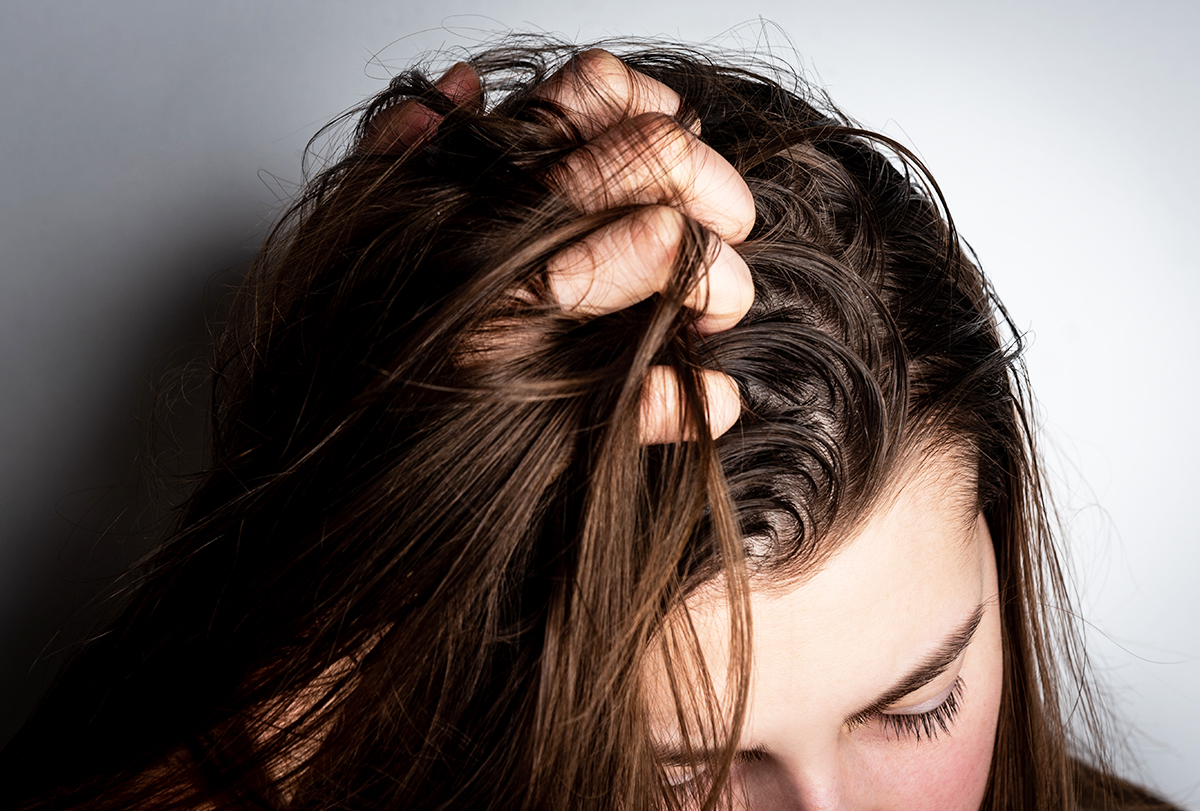
However, excessive production of sebum can make your hair oily, making it feel heavy and thick. It can also increase the risk of scalp problems such as itching and dandruff.
While oily hair is rarely a medical concern, it is best to manage the problem timely to prevent hair issues. This article discusses the various causes of oily hair, home remedies, and lifestyle tips that can help manage the condition.
Home Remedies for Oily Hair
Oily hair is generally a mild problem that can be managed using home remedies made of natural ingredients.
You can try the following at-home remedies to help clear the excess oil and regulate the activity of the sebaceous glands to some extent. These may also help improve your hair health and texture in general.
1. Use lemon-based masks

Lemons have high vitamin C content and an acidic nature that can help clear the excess oil from your hair. They can also regulate the scalp pH as it has been shown that a scalp pH above 5.5 is associated with irritation. (1)
You can use lemon juice with egg whites to help retain moisture and prevent dryness.
How to use:
- Mix 1–2 tbsp of yogurt with 1–2 tsp of lemon juice.
- Apply the mask to your hair, and put on a shower cap.
- Wash off the mask after 20 minutes.
- Repeat this remedy weekly.
2. Prepare a scalp scrub
Scalp scrubs exfoliate the scalp, unclogging the scalp pores, preventing scalp buildup, and removing dead skin cells and dirt. They also boost hair growth.
How to use:
- Mix 2 tbsp each of ground coffee and coarsely crushed walnuts.
- Make a thick paste by adding water.
- Shampoo your hair, and then massage this mixture to your scalp using your fingers.
- Rinse your hair.
3. Rinse with rice water
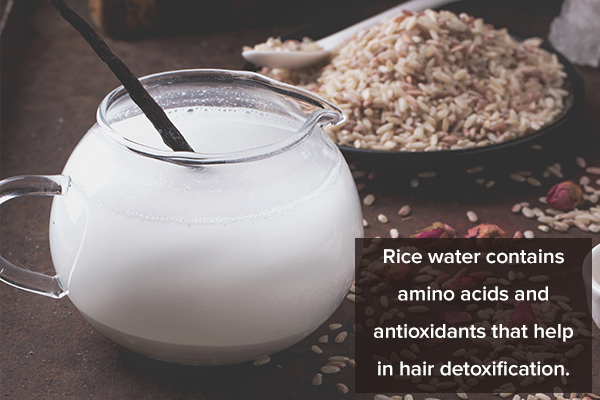
Rice water is rich in minerals and vitamins, including vitamins B and C. It also contains amino acids and antioxidants that help in hair detoxification.
How to use:
- Soak rice in water for at least 1 hour or overnight and strain it.
- Use the rice water on your shampooed hair and massage it in for a few minutes.
- Give a final rinse with plain water, and allow your hair to dry.
4. Use apple cider vinegar
The acidic nature of apple cider vinegar helps regulate scalp pH and consequently decreases oil secretion. It also prevents oil accumulation on the scalp and makes your hair smooth.
How to use:
- Dilute 2–3 tsp of apple cider vinegar in 1 cup of water.
- Use the mixture to rinse your hair.
- Shampoo your hair after a few minutes.
5. Apply aloe vera
Aloe vera can absorb the excess oil from your scalp and can regulate oil production by the sebaceous glands. Aloe vera also possesses antibacterial and antifungal properties, which help prevent scalp infections.
How to use:
- Extract fresh aloe vera gel.
- Apply it to your hair and scalp.
6. Make an egg yolk hair mask
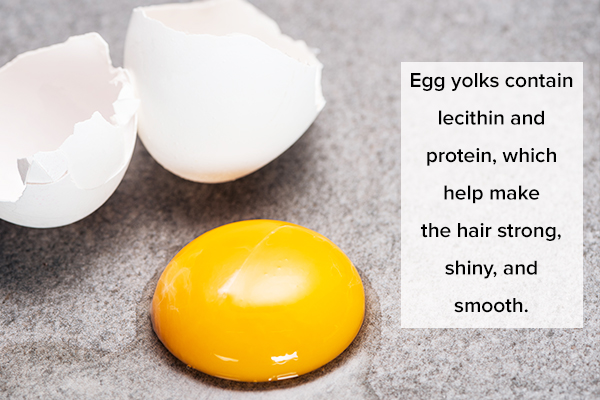
Egg yolks are rich in sulfur, which helps manage oiliness and dandruff. Egg yolks also contain lecithin and protein, which help make the hair strong, shiny, and smooth.
How to use:
- Separate the egg yolks of two eggs and mix in 1 tsp of lemon juice.
- Apply the mixture to your hair.
- Wash it off after 15 minutes using lukewarm water.
7. Apply henna
The cooling and soothing effects of henna help regulate overactive sebaceous glands, therefore controlling oil production. Moreover, henna application helps regulate scalp pH, aiding in the functioning of hair follicles.
How to use:
- Mix henna powder or leaves with coconut oil.
- Apply the mixture to your scalp and hair.
- Wash it off after 30–40 minutes.
Causes of Oily Hair
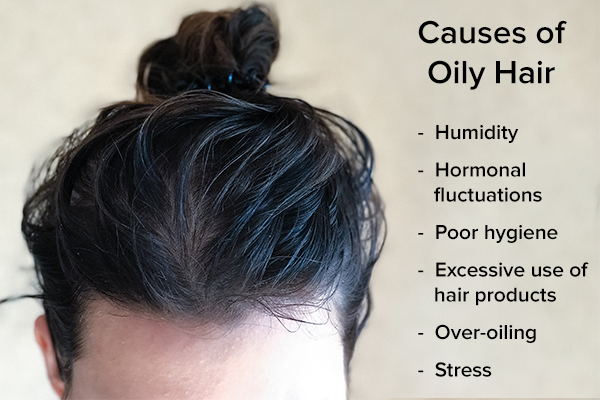
The most common cause of oily hair is oversecretion of sebum by the sebaceous glands on the scalp. Various other factors can also contribute to oily hair, including:
- Humidity: It is common to see your hair becoming oily in hot, humid weather, even after shampooing.
- Hormonal fluctuations: Hormonal changes associated with menopause and puberty can put your sebaceous glands into overdrive, resulting in oily hair.
- Poor hygiene: Not washing your hair regularly and using unwashed pillowcases, bedsheets, hair accessories, or hair tools can result in scalp buildup and can turn your hair oily and greasy.
- Excessive use of hair products: Conditioning your hair daily or using too much hair serum and other hair products can make your hair oily.
- Over-oiling: While oiling the hair is recommended for improved hair health and growth, over-oiling can clog the scalp pores and make the hair sticky or greasy. Moreover, it increases the chances of developing dandruff.
- Stress: Unmanaged prolonged stress can trigger overproduction of sebum by the sebaceous glands, making the hair oily.
Lifestyle Changes
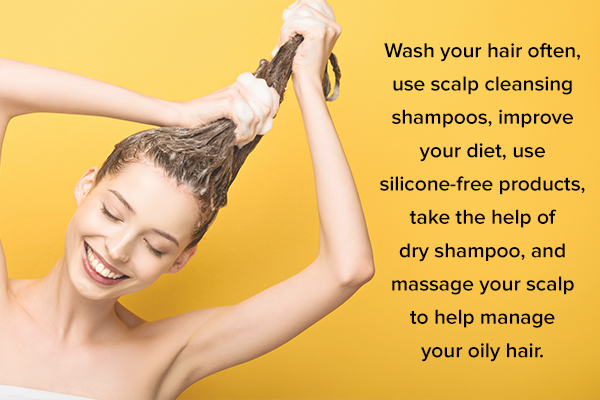
The following tips and products can help manage your hair oiliness better:
- Wash your hair often: It is vital to wash and cleanse your scalp regularly to remove the dirt, product buildup, and pollutants that may have settled on the scalp. If you do not wash your hair for long periods, the buildup can block your pores and hair follicles, leading to problems such as oiliness, acne, and dandruff.
- Use scalp-cleansing shampoos: Include scalp-cleansing shampoos in your hair care routine. These products remove dirt and dust from the scalp and protect the hair shaft from damage. (2)
- Improve your diet: Consume foods rich in omega-3 fatty acids, protein, and vitamin A to maintain the health of your hair.
- Use silicone-free products: Silicone accumulates fast in the scalp, clogging hair follicles, increasing oil production, and making the hair look lifeless and drab. Therefore, make sure you use silicone-free products only.
- Try dry shampoo: Dry shampoo is a quick fix for oily hair as it absorbs the excess oil from the roots.
- Massage your scalp: Massaging your scalp with oils every once in a while ensures healthy growth of hair. It also prevents scalp dryness, which can stimulate excessive oil production.
Preventive Tips
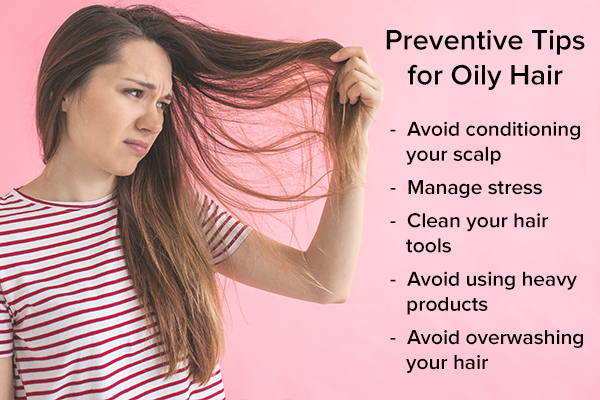
Once you know the various factors that contribute to oily scalp or hair, you can take the necessary steps to prevent it. Some of these include:
- Avoid conditioning your scalp: Do not apply conditioner to your scalp as it can make it oily. You should use conditioner only on the length of your hair.
- Manage stress: Stress management through yoga, meditation, and other techniques helps prevent hormonal imbalance, which can trigger oil overproduction.
- Clean your hair tools: Unclean hair tools such as hairbrushes can transfer dirt to your scalp. To prevent the accumulation of dirt, clean your hairbrushes at least once a month.
- Avoid using heavy products. Refrain from using styling products such as waxes, heavy oils, and cream, especially on the scalp, as they can cause oiliness.
- Avoid overwashing your hair: While it is necessary to shampoo and cleanse your hair, overdoing it can also cause hair oiliness. Shampoo your hair 2–3 times a week, and if you feel excessive sweat accumulation after a workout, give your hair a quick rinse.
Complications Associated With an Oily Scalp
Not taking care of your oily hair can lead to the following problems:
- Seborrheic dermatitis: This chronic problem is a type of dermatitis that causes dandruff and itching. (3)
- Folliculitis: It is a skin condition that presents as pimples or bumps on the scalp and is caused by bacterial or fungal infections that cause inflammation in the hair follicles.
- Forehead acne: The oil from your scalp and hair strands can affect your facial skin and clog the pores, leading to the formation of acne.
When to See a Doctor
The problem of oily hair doesn’t generally require any medical attention. However, if you are unable to manage the condition despite doing proper hair care and using home remedies, you can consult your dermatologist to determine if it is caused by an underlying condition.
Most-Asked Questions About Oily Hair
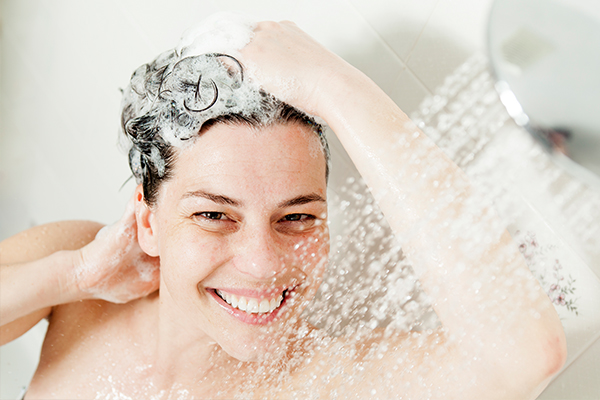
Should I wash my hair every day to make it non-oily?
While washing your hair daily might seem to be a good solution, it can rather trigger the sebaceous glands to produce more oil to remoisten and renourish your hair. Therefore, avoid washing your hair daily.
Can hair oiliness result in hair loss?
Oily scalp is rarely a cause of hair loss. However, it may contribute to hair loss due to other causes and can also impede the growth of new hair by clogging the pores.
Final Word
Oily scalp and hair are common and often irritating problems. The good thing is they are easy to prevent and manage.
Developing a proper hair care routine, using home remedies, and maintaining good hair hygiene are some of the ways to manage and prevent oily scalp and hair. Make sure to observe the response of your scalp and hair to each measure to determine what suits you best.
- Was this article helpful?
- YES, THANKS!NOT REALLY


